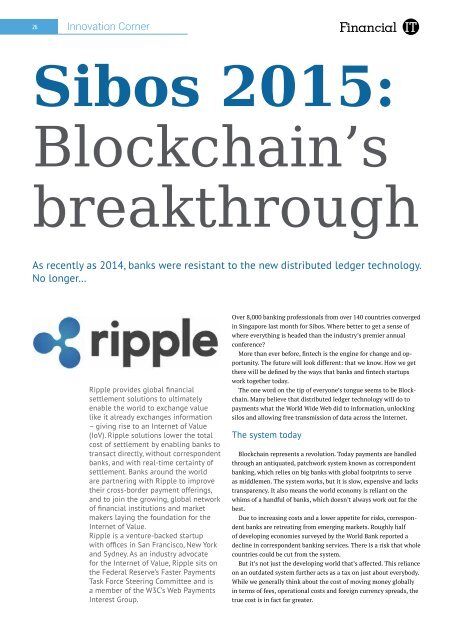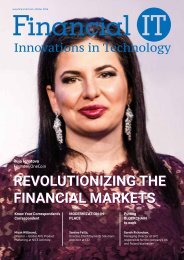Revolutionizing the Financial Markets
You also want an ePaper? Increase the reach of your titles
YUMPU automatically turns print PDFs into web optimized ePapers that Google loves.
26<br />
Innovation Corner<br />
Sibos 2015:<br />
Blockchain’s<br />
breakthrough<br />
As recently as 2014, banks were resistant to <strong>the</strong> new distributed ledger technology.<br />
No longer…<br />
Ripple provides global financial<br />
settlement solutions to ultimately<br />
enable <strong>the</strong> world to exchange value<br />
like it already exchanges information<br />
– giving rise to an Internet of Value<br />
(IoV). Ripple solutions lower <strong>the</strong> total<br />
cost of settlement by enabling banks to<br />
transact directly, without correspondent<br />
banks, and with real-time certainty of<br />
settlement. Banks around <strong>the</strong> world<br />
are partnering with Ripple to improve<br />
<strong>the</strong>ir cross-border payment offerings,<br />
and to join <strong>the</strong> growing, global network<br />
of financial institutions and market<br />
makers laying <strong>the</strong> foundation for <strong>the</strong><br />
Internet of Value.<br />
Ripple is a venture-backed startup<br />
with offices in San Francisco, New York<br />
and Sydney. As an industry advocate<br />
for <strong>the</strong> Internet of Value, Ripple sits on<br />
<strong>the</strong> Federal Reserve’s Faster Payments<br />
Task Force Steering Committee and is<br />
a member of <strong>the</strong> W3C’s Web Payments<br />
Interest Group.<br />
Over 8,000 banking professionals from over 140 countries converged<br />
in Singapore last month for Sibos. Where better to get a sense of<br />
where everything is headed than <strong>the</strong> industry’s premier annual<br />
conference?<br />
More than ever before, fintech is <strong>the</strong> engine for change and opportunity.<br />
The future will look different: that we know. How we get<br />
<strong>the</strong>re will be defined by <strong>the</strong> ways that banks and fintech startups<br />
work toge<strong>the</strong>r today.<br />
The one word on <strong>the</strong> tip of everyone’s tongue seems to be Blockchain.<br />
Many believe that distributed ledger technology will do to<br />
payments what <strong>the</strong> World Wide Web did to information, unlocking<br />
silos and allowing free transmission of data across <strong>the</strong> Internet.<br />
The system today<br />
Blockchain represents a revolution. Today payments are handled<br />
through an antiquated, patchwork system known as correspondent<br />
banking, which relies on big banks with global footprints to serve<br />
as middlemen. The system works, but it is slow, expensive and lacks<br />
transparency. It also means <strong>the</strong> world economy is reliant on <strong>the</strong><br />
whims of a handful of banks, which doesn’t always work out for <strong>the</strong><br />
best.<br />
Due to increasing costs and a lower appetite for risks, correspondent<br />
banks are retreating from emerging markets. Roughly half<br />
of developing economies surveyed by <strong>the</strong> World Bank reported a<br />
decline in correspondent banking services. There is a risk that whole<br />
countries could be cut from <strong>the</strong> system.<br />
But it’s not just <strong>the</strong> developing world that’s affected. This reliance<br />
on an outdated system fur<strong>the</strong>r acts as a tax on just about everybody.<br />
While we generally think about <strong>the</strong> cost of moving money globally<br />
in terms of fees, operational costs and foreign currency spreads, <strong>the</strong><br />
true cost is in fact far greater.







